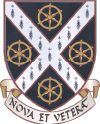Fellows impress at Curiosity Carnival
On the evening of September 29th, venues all over Oxford were taken over by researchers from across the University, to present their research to members of the public and showcase what goes on behind the University’s closed doors, in Oxford’s biggest ever public engagement event. Oxford’s Curiosity Carnival joined hundreds of other European cities in celebrating European Researchers’ Night, an evening of events dedicated to explaining research through fun, interactive learning. The Curiosity Carnival offered a chance to find out what research is really all about, meet researches, ask questions and discover how research affects and changes our lives.
One of the many venues hosting the Carnival was the Pitt Rivers Museum, which on arrival had queues winding around the block, with families, University members, and tourists alike eager to join in such a unique event.
Inside the museum, Dr Jessica Goodman, our Fellow and Tutor in French, along with her colleague Dr Helen Swift, Associate Professor of Medieval French and Fellow of St Hilda’s College, ran an interactive stall: You Are What You Leave. Bringing together their shared interest in the relationship between death, posterity and human identity, Drs Swift and Goodman aim to consider the composition of identity through objects. At the Curiosity Carnival, they engaged the public in discussion about how someone is defined and remembered when they die by the remains of their possessions.

(Photo copyright: Jessica Goodman)
Speaking about the event, Dr Goodman said ‘It was a great night. I don’t think we stopped talking to people for the whole three hours! It was fantastic to be able to use some Pitt Rivers objects to spark people’s interest in the themes we work on in French texts from the past, which might initially seem inaccessible.
“I found it exciting to see people applying the idea of ‘You are what you leave’ to their own lives, whether it was the teenager telling us how he frequently deleted his Instagram pictures because they didn’t represent him any more, or the older woman deciding she needed to think about what she could leave her children.
“And people were really creative in the ‘legacies’ they left behind on our tree – from inspiring quotes, to pictures of their favourite things, to a fair number of very honest admissions that what our generation will leave will be ‘a lot of rubbish’.”

(Photo copyright: Jessica Goodman)
Also flying the flag for Catz on the night was Professor Kirsten Shepherd-Barr, our Fellow and Tutor in English, who, in collaboration with Professor Sally Shuttleworth, Professor of English Literature and Fellow of St Anne’s College, and Chipping Norton Theatre, brought The Contagion Cabaret to life at the Pitt Rivers Museum. Opening with a performance of ‘I Got It From Agnes’ by Tom Lehrer and featuring extracts and songs from various news articles, Angels in America, Arthur Miller’s The Crucible, Sweeney Todd and many more, the Contagion Cabaret was an entertaining but thought-provoking illustration of contagion through the years.
Over at the Ashmolean Museum, Laura Molloy, artist and Catz Graduate Student, was also presenting her own project: #HumansOfData. A doctoral researcher at the Oxford Internet Institute and the Ruskin School of Art, Laura’s thesis is about how visual artists manage their digital information and what value it brings to their art practice, and at the Ashmolean she presented a pop-up photo gallery showing portraits of the humans who collect, manage and use data. Visiting participants were encouraged to consider the role of data in their own lives and how they felt about the data that is collected about them. Laura took over 130 portraits of visitors to the installation throughout the evening, resulting in 22 new conversations which will be published online at www.humansofdata.com over the coming months.
.jpg)
(Photo copyright: Laura Molloy)
The Curiosity Carnival was a huge festival of learning and engagement – a city-wide programme of activities across the University of Oxford’s museums, libraries, gardens and woods. There were wide-ranging activities for all ages and interests, and all staff, students and Fellows should be immensely proud of the success of the inaugural event.



